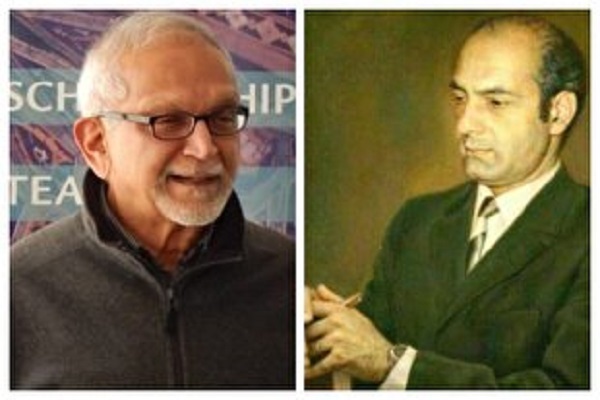Critical Methodology in Islamic Studies Main Aspect of Shariati's Achievements

June 19 is the anniversary of Ali Shariati's death, the Iranian thinker whose ideas are controversial 45 years after his death.
In an interview with IQNA, Professor Abdulaziz Sachedina, Professor in Islamic Studies at George Mason University in Fairfax, Virginia talked about his memories of Shariati's classes and his character and ideas. Dr. Sachedina, who has studied in India, Iraq, Iran, and Canada, obtained his Ph.D. from the University of Toronto. He has been conducting research and writing in the field of Islamic Law, Ethics, and Theology (Sunni and Shiite) for more than two decades.
Here is the text of the interview:
IQNA: Please tell us about your acquaintance and friendship with Dr. Shariati. How did you become interested in his personality?
Sachedina: When I finished my education in India I came to Iran. I was auditing courses at Ferdowsi University of Mashhad. This was in 1966. Dr. Shariati had returned from France at approximately same time and he was the center of attraction for many young people in the university. I enrolled in his courses on history and became his follower. His approach to teaching was very special and the courses he taught about Islamic history revealed his knowledge and his new fresh approach to discuss the reliability of the early sources about the Prophet and early community. This was, perhaps, the first time that many of us young students were exposed to critical methodology in understanding Islamic history.
IQNA: What aspects of Shari'ati's thought do you find important and interesting?
Sachedina: This was the time when Garbzadigi of Ale Ahmad was gaining lot of support among the Iranians in search of their native roots and identification. Shariati, like a number of other professors in the Faculty of Arts (adabiyyat), were graduates of French doctorate. However, he was very different. There were no signs of garbdadigi in him. He respected students from anywhere without putting them down. He restored self-respect and honor among Iranians who were all wearing suits and neckties, and drinking beer as a sign of “modernity” in those days. I am from Tanzania and Dr. Shariati liked African countries who were fighting colonialism against France, Germany and England – the three major colonizers of Africa. In his discussion about ‘westoxication’ he was very much influenced by Frantz Fanon and other leftist thinkers. It was the time for me as “colonized” Tanzanian to reappropriate my authenticity and correct identity.
IQNA: Do you consider him a distinctive personality in contemporary Iranian and Islamic thinkers? Did Shariati have new achievements in Islamic studies?
Shariati appeared at a time with “modernizers” like Shah and Ataturk were thoroughly colonized by the US and other international powers. There was a need to understand the reasons why people in Third World suffered backwardness: Was it because of their religion? Their culture? The answer was far more complicated than what the superficial assessment of “Imperialism” rhetoric offered. The Marxists were masking behind their defunct doctrine of “socialism”; the Capitalists were blaming religion and religious leaders for the economic imbalances. Shariati’s work was to expose the fallacies of Western ideologies and raise the questions about the authenticity and sincerity of the so-called reformers. The major change had to occur in Islamic Studies which needed to develop its own methodology based on its cultural legitimacy. How can one compare a Muslim woman to a Western woman in assessing their human dignity? There had to be more authentic tools to assess each society within its cultural setting. Can Muslims develop their own “native” paradigm to evaluate its progression or degradation without analyzing the Western dominance of Middle East resources like the oil industry? Or industrial revolution? The main reason Muslim world was unable to implement their primary paradigm for development was because of the Western interference in the Middle East to advance Western national and military interests. Shariati challenged the “status quo” of the Shah’s government which was geared towards protecting the Pahlavi and Western (US) interests, at the expense of Iranian interest. Shariati coined an important conceptual terms to describe what Iranians were going through in 1960s and 1970s: “self-alienation” (az khod bigangi). I will stop here. Nobody could have remained the same after ‘discovering’ Shariati: a paradigm for sincere and authentic change within the original impulses of the native Iranian culture.
IQNA: What do you think about Shariati's message to the world today? Are his thoughts relevant for today's generation?
Sachedina: I don’t know about the world. I know that Shariati spoke to his own people. I was fortunate to have been his student directly and indirectly for many years. And yet, I want to speculate on the basis of the way he changed us in his own days: “Be authentic, truthful, and sincere in the world that is unlocking the future philosophy of: “How to live as a human person?”
IQNA: Some believe that Shari'ati's ideas and works lack consistency in some ways. What is your opinion?
Sachedina: If you study any great reformer or thinker you will notice this fluctuation between idealistic worship of that leader or realistic assessment of his/her performance in life. Shariati is not any different. A thinker who has enabled you to think critically about yourself to find the future path of your progression is ALWAYS worth our empathy.
Interview by Mohsen Haddadi
 Most Commented
Most Commented 


